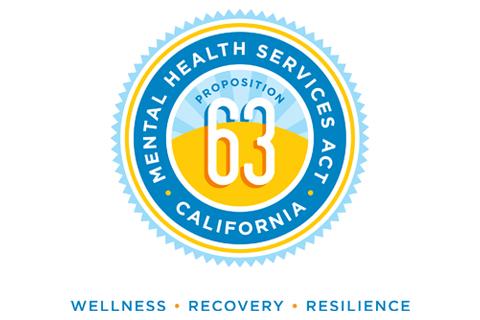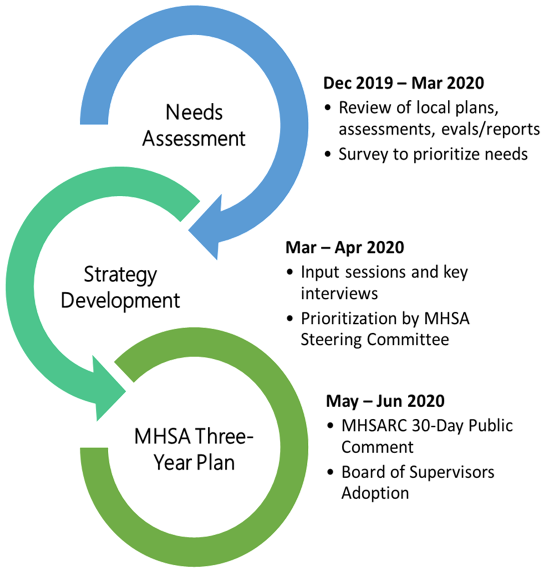Mental Health Services Act Update
MHSA (Prop 63)
Annual Update Public Comment Period Closes February 5
The FY 2019-20 MHSA Annual Update was presented at the Mental Health Substance Abuse and Recovery Commission (MHSARC) meeting on December 4th. The MHSA Annual Update is submitted annually to the State and includes:
- Outcomes of all existing MHSA funded programs including program data, challenges, successes and client stories
- Implementation highlights, progress made, and any amendments to the Three-Year Plan
- Updated budgets
The public comment period for review of the report closes on February 5, 2020. All materials are available on the MHSA website and hard copies are available upon request to mhsa@smcgov.org. Public comments may be submitted to Doris Estremera, MHSA Manager via:
Email: mhsa@smcgov.org
Phone: (650) 573-2889
Mail: 310 Harbor Blvd, Bldg E, Belmont CA
94002
Three-Year Plan, Fiscal Year 2020-2023
The MHSA Three-Year Plan is developed in collaboration with clients and families, community members, staff, community agencies and stakeholders and guides the development and funding of programs. It includes the following:
- description of MHSA funded programs within service categories
- priorities for future funding and/or program improvements
- expenditure projections
Opportunities for input into the Three-Year Plan will be presented at the next Mental Health Substance Abuse and Recovery Commission (MHSARC) meeting on February 5th, 3:30 pm at the San Mateo County Health Campus, Room 100, 225 37th Avenue in San Mateo.
MHSA Steering Committee Meeting
The MHSA Steering Committee is open to the public and meets twice a year to make recommendations to the planning, funding and services development for MHSA.
The MHSA Steering Committee meeting is combined with the monthly Mental Health Substance Abuse and Recovery Commission (MHSARC) meeting in March and October each year. The MHSA portion will begin at 4 pm and (both meetings are open to the public).
MHSA Steering Committee Meeting
Wednesday, March 4
3:30 pm – 4:00 pm (MHSARC)
4:00 pm – 5:30 pm (MHSA)
San Mateo County Health Campus, Room 100, 225 37th
Ave., San Mateo
Agenda items for the next MHSA Steering Committee:
- MHSA Three-Year Plan Needs Assessment and Strategy Development
- Annual available one-time funding
New MHSA Innovation Projects
MHSA Innovation funding allows counties to develop new best practices in behavioral health services and supports. This past year, a broad solicitation effort led to 37 innovative ideas being submitted for consideration. The projects addressed San Mateo County priority need areas including: engagement and integration of older adults, culturally relevant outreach and service delivery, integration of peer/family supports, integration of co-occurring practices, engagement services for transition-age youth, and broader housing options across the continuum of care.
A selection committee made up of MHSA Steering Committee members reviewed project ideas to determine what project(s) fit within the Innovation Project guidelines and available funding. On November 6, 2019, the MHSARC met and reviewed public comments received and closed the 30-day public comment period on five new MHSA Innovation projects:
-
Addiction Medicine Fellowship in a local community
setting
Estimated Project Amount & Length: $591,650 / 3.9 years
The proposed project is an accredited Addiction Medicine Fellowship sponsored by San Mateo County that is tailored to addressing the needs and priorities of the public sector, including treating the most vulnerable communities with co‐occurring substance use disorders, advancing equity on multiple levels and contributing to educational projects in clinical and community settings. This would also be the first Addiction Medicine Fellowship based in a local health safety net health system, serving as a model for California’s 58 counties.
-
Co‐location of Prevention and Early Intervention
Services in Low‐Income Housing
Estimated Project Amount & Length: $925,000 / 3.9 years
The proposed project will provide prevention and early intervention services including behavioral health resources, supports, screening, referrals and linkages to young adults (ages 18‐25), on‐site at affordable housing properties, minimizing stigma and reducing barriers to accessing behavioral health care.
-
PIONEERS – College‐Age Pacific Islander
Mental Health
Estimated Project Amount & Length: $925,000 / 3.9 years
The proposed project, Pacific Islanders Organizing, Nurturing, and Empowering Everyone to Rise and Serve (PIONEERS) provides a culturally relevant, behavioral health college program for Native Hawaiian and Pacific Islander youth that prioritizes the mental well-being of students and their respective communities through empowerment, leadership and advocacy.
-
Older Adult Homelessness Prevention due to Economic
Stress
Estimated Project Amount & Length: $750,000 / 3.9 years
The proposed project will reach out and engage isolated older adults who may be at risk of becoming homeless. Trust and safety will be established to reduce shame/stigma. Older adults will be screened for economic stress, behavioral health issues, and connected to homeless, housing and behavioral health resources for planning and support, to prevent acute homelessness and to slow the growing older adult homeless population trend. The innovation will create a new partnership between Human Services Agency Center for Homelessness providers, Older American Act programs, Behavioral Health and Recovery Services, and Aging and Adult Services.
-
Social Enterprise Cultural and Wellness
Café
Estimated Project Amount & Length: $2,625,000 / 5 years
The proposed project is a cultural arts and wellness‐focused social enterprise café that offers youth development and mental health programming on site. The social enterprise café will hire and train at‐risk youth from Northern San Mateo County and serve as a culturally affirming space for Filipino/a/x youth and community. The social enterprise model has proven to be a more sustainable approach when it comes to stable and diversified funding streams. Most of the existing community organizations that offer some elements of the proposed project rely heavily on grant‐writing and fundraising.
Visit the MHSA website for more info about San Mateo County’s program.

